Topics in Statistical Information Theory » książka
Topics in Statistical Information Theory
ISBN-13: 9780387965123 / Angielski / Miękka / 1987 / 159 str.
The relevance of information theory to statistical theory and its applications to stochastic processes is a unifying influence in these TOPICS. The integral representation of discrimination information is presented in these TOPICS reviewing various approaches used in the literature, and is also developed herein using intrinsically information-theoretic methods. Log likelihood ratios associated with various stochastic processes are computed by an application of minimum discrimination information estimates. Linear discriminant functionals are used in the information-theoretic analysis of a variety of stochastic processes. Sections are numbered serially within each chapter, with a decimal notation for subsections. Equations, examples, theorems and lemmas, are numbered serially within each section with a decimal notation. The digits to the left of the decimal point represent the section and the digits to the right of the decimal point the serial number within the section. When reference is made to a section, equation, example, theorem or lemma within the same chapter only the section number or equation number, etc., is given. When the reference is to a section, equation, etc., in a different chapter, then in addition to the section or equation etc., number, the chapter number is also given. References to the bibliography are by the author's name followed by the year of publication in parentheses. The transpose of a matrix is denoted by a prime; thus one-row matrices are denoted by primes as the transposes of one-column matrices (vectors)."











